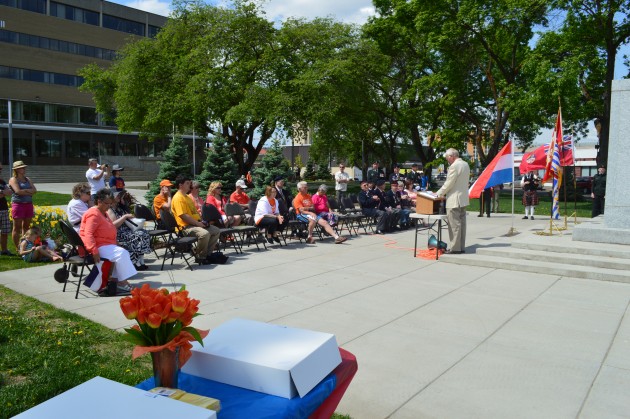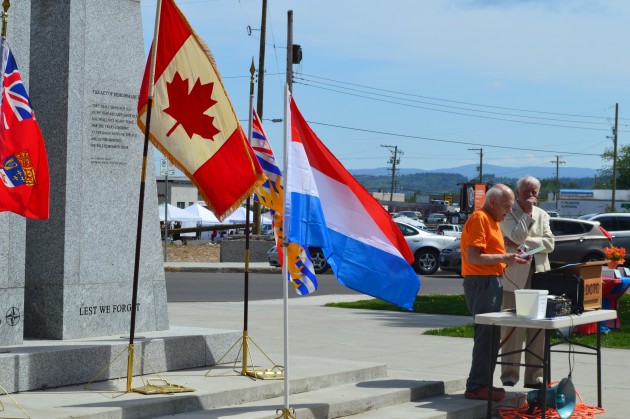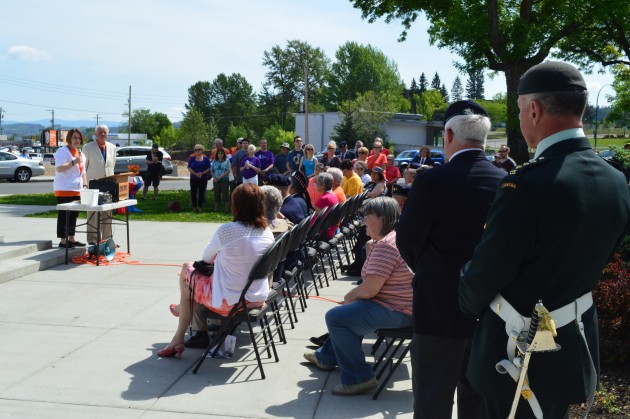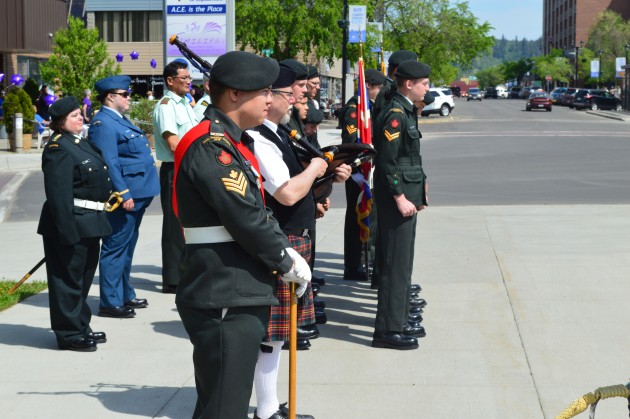It’s Not About The Tulips, Rather The Gratitude
Prince George, B.C. – Members of the local Dutch community gathered with Canadian war veterans, the youth of the Rocky Mountain Rangers, dignitaries and residents of Prince George to commemorate the liberation of Holland from German occupation by Canadian soldiers during the second World War.
The operation to take the lowlands was waged by Canadian forces from September, 1944 to April, 1945. Holland was officially liberated on May 5th, 1945. Seven thousand-six hundred Canadian soldiers died to secure that liberation. It is that herculean and costly sacrifice that the Dutch people honour each year, and the tulip has become a symbolic way for the Dutch to express their gratitude to Canada.
The ceremony here is held at Veterans’ Plaza at City Hall, and in past years the tulips have been out in full, bright bloom. Hank Bekkering led Saturday’s ceremony. “The tulips are not as well-developed as we had hoped them to be. We hope for a better show next year again.”
“I am a proud Canadian and have been for a number of years. Every once in a while I become a Hollander again, and today I am that, I am a Hollander and very proud of that also. We’re a small committee that has been setting this up since 1994. It was started by Mr Gerry DeWitt, who has since passed away and it has been taken over by Mr Volunteer Prince George, Dick Voneugen.”
“I was 7 years old when Canadian soldiers in tanks rolled in through Utrecht in 1945 and Holland was at last freed from the Nazis. If the last 2 years of the occupation were any indication of how terrible the occupation was, I tell you that I and many others here would not have survived had the Canadian soldiers not made this heroic effort. My family, in the last two years, survived on thistles and sugar beet juice during probably the worst winter that Holland has ever seen.”
“The planting of tulip seeds here is our way of saying thank you. The soldiers who still live today, and we know there are fewer and fewer of you at the liberation of 70 years ago. No matter how many years go by the Dutch, and certainly I, will never forget what Canada did for us.”
“One thing that stands out for me was, through the occupation we were forbidden to have orange cloth, and on liberation day all the jubilant Dutch people lined the streets waving a sea of orange flags or rags etcetera that they had hidden away. Thinking back of that it still gives me goose bumps. So again, on behalf of the Dutch people living in Prince George, thank you very much.”
Prince George-Valemount MLA Shirley Bond happily pointed out that the crowd attending the ceremony appeared bigger than last year, adding “I think that is really fantastic.” There were 135 people who turned out under a sunny sky.
“For those of you that do not know,” stated Bond, “my mother’s name was Gretta Johanna Wilhelmina Vink, a proud, very hard-working Dutch woman who I am incredibly proud of. She has since passed away but I wear orange today to remember her and to give thanks.”
“But it really needs to start with the people who are here today, our veterans. Thank you to the Rocky Mountain Rangers who are here today, you are the next generation of people to serve our country and I want you to think about the Dutch flag today as you come and you serve here, because it is the symbol of gratitude.”
“I hope that today you will take a moment to share with all of the veterans that are here today, our profound gratitude. So to each of you, thank you so much for being here today. You truly give us the country that we are able to live in. We are so glad that you’re here.”
“I can remember my mother telling us stories as children and it usually revolved around food. And that’s because it was called the Hunger Winter, and it was really quite unprecedented because it was a modern developing country that was locked in famine. People just watched their food supply dwindle and dwindle and yes, there were some airdrops but they got fewer and fewer. The staple was often sugar beets or tulip bulbs.”
“My mother used to say to us when we were complaining about dinner or whatever, she would remind us what she had and her family had to survive on which was tulip bulb soup, and all of the things that they had to struggle through. There was very little heat. Their furniture in their homes became part of what kept them warm.”
“But all I remember as every time I have visited my family in Holland is the incredible gratitude that the Dutch feel for Canadians. And it is profound, you are welcomed you are loved and its because the men that served us went and liberated and changed the circumstances for our Dutch families. And so today we remember, we say thank you and we certainly want to continue this tradition.” “And, while the tulips are an important symbol, even if they’re not at their peak as we speak it doesn’t matter. What matters is that we continue to remember and to give thanks.”
“Thank you to the committee and most of all, thank you to the men who gave their lives, who sacrificed and liberated the country of Holland so that my mother could come and be a Canadian citizen. We are very grateful and proud of that to this day.”





Comments
I always thou8ght they planted tulip bulb’s. never herd of tulip seeds.
Cheers
There are three ways to propagate plants in the tulip group . Bulb division , seed planting and cell culture . The flower head produces the seeds . Cross pollinating various varieties of tulips then harvesting and planting the seeds is how one gets variations ( plant sex ) . Hope that helps you R2 .
Btw r2 luv seaing udderz playing wit da spelzing natzies .
“Cross pollinating various varieties”…..can this be considered genetically modifying tulips ?
Alright so my figer slippred and I didn’t proof read.
Cheers
Well in the 50 odd years that I have been gardening I have never seen or planted a tulip seed.
Cheers
Comments for this article are closed.